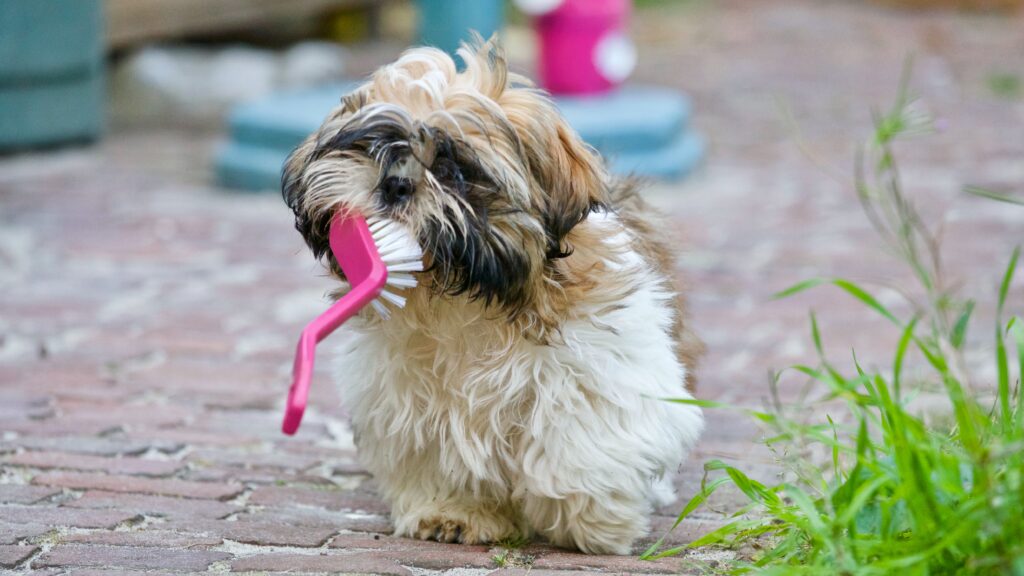
The importance of dog dental care for overall health
Dogs are known to be man’s best friend, but did you know that their dental health is just as important as their loyalty? That’s right! Dog dental care plays a crucial role in maintaining their overall health and happiness. So, let’s take a moment to sink our teeth into the importance of dog dental care.
Have you ever tried giving your dog a big, cheesy grin? If you have, you might have noticed some yellowing or bad breath. That’s because dogs are prone to dental problems just like humans. But don’t worry, with proper dental care, we can keep those pearly whites shining bright and their tails wagging happily. So, let’s explore the world of dog dental care and discover the best ways to keep our furry friends healthy and happy.
The Importance of Regular Brushing in Dog Dental Care
Good dental hygiene is essential to a dog’s overall health and well-being. Regular brushing helps prevent periodontal disease, tooth decay, and bad breath, which can cause discomfort, pain, and serious health problems.
Here are some tips for regular brushing in dog dental care:
- Start early and make it a routine
- Use a soft-bristled toothbrush and dog-friendly toothpaste
- Brush at a 45-degree angle and focus on the gum line
- Be gentle and positive, using treats and praise to reinforce good behavior
- Consider professional cleanings for severe cases or difficult dogs
- Stay consistent and track progress to ensure success
Regular brushing is an easy and effective way to maintain your dog’s dental health and prevent costly and painful dental problems down the line.
The Connection Between Dental Health and Your Dog’s Overall Well-Being
Dental health is a vital part of your dog’s overall well-being. Poor dental hygiene can lead to serious health problems such as heart, liver, and kidney disease, as well as pain, discomfort, and bad breath.
Here are some ways dental health affects your dog’s overall well-being:
- Proper digestion starts with healthy teeth and gums
- Dental disease can lead to infection, pain, and discomfort
- Poor dental hygiene can cause bad breath and affect your dog’s socialization
- Severe dental problems can lead to costly and invasive procedures
- Healthy teeth and gums can lead to a longer, happier life for your dog
By prioritizing dog dental care, you are not only ensuring a healthier mouth but also a healthier dog overall.
The Importance of Early Detection in Dog Dental Care
Early detection is critical in dog dental care. Catching dental problems early can prevent costly and painful procedures down the line, as well as improve your dog’s overall health and well-being.
Here are some ways to detect dental problems early:
- Regularly check your dog’s teeth and gums for signs of plaque, tartar, or bleeding
- Look out for signs of discomfort such as whining, drooling, or reluctance to eat
- Schedule regular dental check-ups with your vet
- Consider dental X-rays for a more comprehensive examination
- Take immediate action if you notice any issues, such as scheduling a professional cleaning or changing your dog’s diet
By catching dental problems early, you can help prevent more severe issues and maintain your dog’s dental health for years to come.
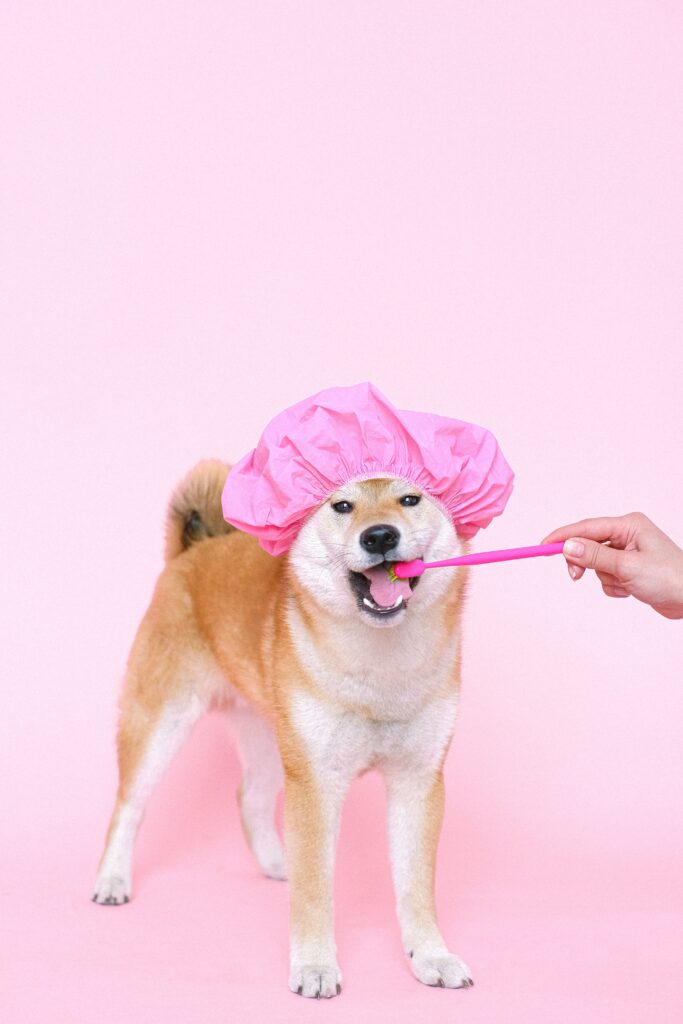
Top Foods to Include in Your Dog’s Diet for Good Dental Health
Good dental health in dogs starts with a well-balanced diet that provides all the necessary nutrients for strong teeth and gums. Here are some of the best foods to include in your dog’s diet for good dental health:
- Hard, crunchy foods like kibble and carrots can help scrape away plaque and tartar buildup.
- Fresh fruits and vegetables, like apples and celery, can help clean teeth and freshen breath.
- Lean proteins like chicken and turkey can help build strong teeth and gums.
By including these foods in your dog’s diet, you can help promote good dental health and prevent dental problems down the line.
How Often Should You Brush Your Dog’s Teeth?
Regular brushing is a key part of dog dental care, but many pet owners are unsure how often they should be brushing their dog’s teeth. Here are some tips to help you determine how often to brush:
- Most dogs should have their teeth brushed at least 2-3 times per week.
- Dogs with existing dental problems may need more frequent brushing.
- Puppies should start getting used to toothbrushing as soon as their adult teeth come in.
By brushing your dog’s teeth regularly, you can help prevent dental problems and keep your dog’s mouth healthy and happy.
The Role of Water Additives in Dog Dental Care
Water additives are becoming an increasingly popular way to promote good dental health in dogs. Here’s what you need to know about these products:
- Water additives contain ingredients that can help fight plaque and tartar buildup.
- They are easy to use – simply add the recommended amount to your dog’s water dish.
- Water additives are not a substitute for regular brushing and dental checkups.
While water additives can be a helpful addition to your dog’s dental care routine, it’s important to remember that they should be used in conjunction with other preventative measures for the best results.
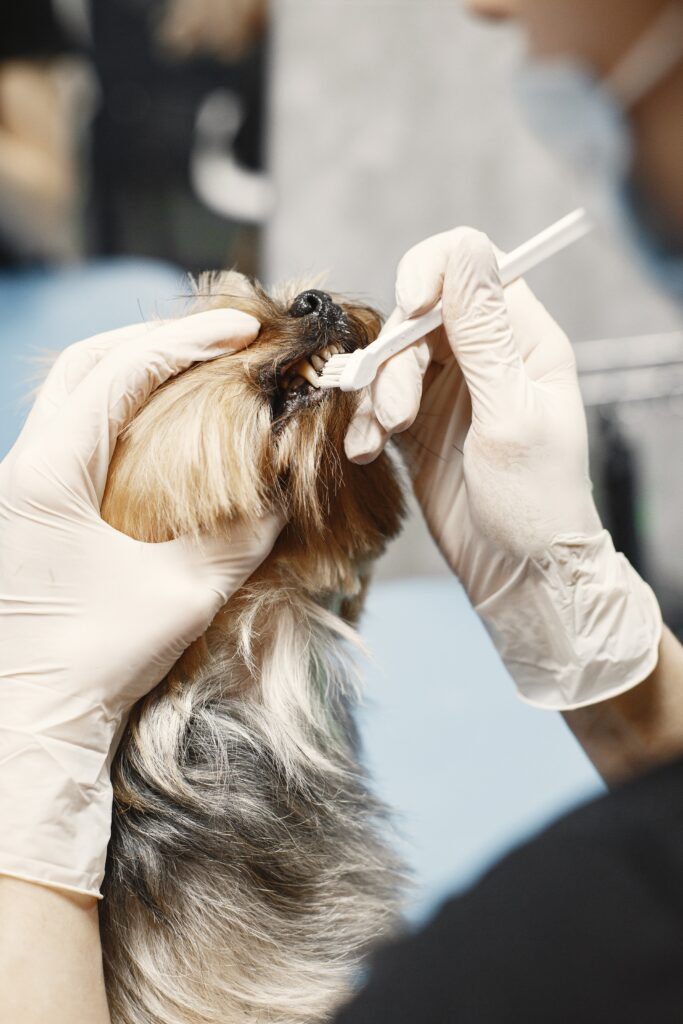
Common dental problems in dogs and how to prevent them
Signs and Symptoms of Dental Problems in Dogs
Maintaining proper dental care is essential to ensure your dog’s overall health and well-being. However, dental problems can occur even with good care. Here are some signs and symptoms that your dog may be experiencing dental problems:
- Bad breath
- Red, swollen, or bleeding gums
- Yellow or brown teeth
- Loose or missing teeth
- Difficulty eating or dropping food from the mouth
- Pawing at the face or mouth
- Discharge from the nose
If you notice any of these signs or symptoms, it’s important to take your dog to the vet for a dental checkup as soon as possible. Early detection and treatment can prevent further dental problems and discomfort for your furry friend.
Tips for Preventing Dental Problems in Dogs
Prevention is key when it comes to maintaining good dental health for your dog. Here are some tips to prevent dental problems in your furry friend:
- Regular teeth brushing with dog toothpaste
- Providing dental chews and toys
- Feeding a healthy diet with appropriate nutrients
- Regular vet checkups and dental cleanings
- Monitoring your dog’s dental health and seeking veterinary care when necessary
By implementing these preventative measures, you can help your dog maintain good dental health and avoid painful dental problems in the future.
The Connection Between Dental Hygiene and Fresh Breath in Dogs
Fresh breath is not only pleasant for you and your dog, but it can also be a sign of good dental hygiene. Here’s how dental hygiene and fresh breath are connected in dogs:
- Bacteria in the mouth can cause bad breath and dental problems.
- Regular teeth brushing and dental cleanings can help prevent bacteria buildup and promote fresh breath.
- Certain foods and treats can help freshen breath and promote good dental hygiene.
If your dog has persistent bad breath, it’s important to have their dental health checked by a vet to rule out any underlying dental problems. By prioritizing your dog’s dental hygiene, you can help promote fresh breath and overall good health.

The Role of Diet in Preventing Dental Problems in Dogs
As with humans, a healthy diet is key to a dog’s overall health, including their dental health. Here are some tips for maintaining a healthy diet for your dog’s dental care:
- Feed your dog high-quality, nutrient-rich food that is appropriate for their age, breed, and activity level.
- Choose dental care-specific dog food that has been formulated to help clean teeth and prevent plaque buildup.
- Provide plenty of fresh, clean water for your dog to drink throughout the day, as hydration is important for healthy teeth and gums.
- Avoid giving your dog sugary or starchy treats that can contribute to dental problems.
- Consult with your veterinarian or a veterinary nutritionist to determine the best diet plan for your dog’s specific needs.
By ensuring your dog receives a healthy diet, you are helping to prevent dental problems and maintaining their overall health and well-being.
How to Properly Inspect Your Dog’s Teeth and Gums
Regular dental checkups are essential for a dog’s dental health, but you can also perform regular inspections at home. Here are some steps for inspecting your dog’s teeth and gums:
- Start by getting your dog comfortable with having their mouth handled. Offer treats and praise while gently lifting their lips and examining their teeth and gums.
- Look for signs of dental problems, such as bad breath, loose or missing teeth, bleeding or swollen gums, and brown or yellow tartar buildup.
- Use a soft-bristled toothbrush and dog-friendly toothpaste to gently brush your dog’s teeth, aiming for at least once a day.
- Consider using dental chews, toys, or water additives that are designed to promote good dental health.
- Schedule regular dental checkups with your veterinarian to catch and address any potential dental problems early.
By inspecting your dog’s teeth and gums regularly and incorporating good dental care practices, you can help prevent dental problems and ensure your dog’s overall health and happiness.
The Importance of Regular Vet Checkups for Your Dog’s Dental Health
Regular veterinary checkups are crucial for maintaining your dog’s dental health. Here are some reasons why:
- Veterinarians can detect and address dental problems early on, preventing them from worsening and causing more serious health issues.
- Vets can perform professional dental cleanings and procedures that are difficult or impossible to do at home.
- Regular checkups can help identify underlying health problems that may be affecting your dog’s dental health.
- Your veterinarian can provide personalized recommendations for your dog’s dental care routine, including advice on diet, brushing, and dental products.
By scheduling regular vet checkups for your dog, you are investing in their overall health and well-being, including their dental health.

Types of products and how to use them effectively
Choosing the Right Dog Dental Care Products for Your Pet
Regular dental care is essential for maintaining your dog’s oral health. Choosing the right dental care products can be overwhelming, but it’s important to consider your dog’s specific needs when selecting products. Here are some tips:
- Look for products that have the Veterinary Oral Health Council (VOHC) seal of approval
- Choose a toothbrush and toothpaste that is specifically formulated for dogs
- Consider dental chews, treats, and toys that can help reduce plaque and tartar buildup
- Consult with your veterinarian for recommendations on the best dental care products for your dog
- Avoid dental care products that contain harmful ingredients such as xylitol or fluoride
- Introduce dental care products slowly and be patient with your dog’s progress
Proper dental care products can make a significant impact on your dog’s oral health, so take the time to research and choose the right products for your furry friend.
Brushing Your Dog’s Teeth: Tips and Techniques
Brushing your dog’s teeth is an important part of their dental care routine. Here are some tips and techniques to make the process easier:
- Use a toothbrush and toothpaste that is specifically formulated for dogs
- Start slow and gradually increase the amount of time you spend brushing your dog’s teeth
- Use a circular motion and focus on the gumline where plaque and tartar buildup is common
- Reward your dog with treats or praise for their cooperation
- Use a finger brush or gauze pad if your dog is resistant to a regular toothbrush
- Schedule regular dental checkups with your veterinarian to monitor your dog’s oral health
Consistent brushing can prevent dental problems and keep your dog’s breath fresh. With patience and practice, brushing your dog’s teeth can become an enjoyable bonding experience for both of you.
How to Use Dental Chews and Treats Effectively
Dental chews and treats can be a helpful addition to your dog’s dental care routine. Here are some tips for using them effectively:
- Choose dental chews and treats that are specifically designed to promote dental health
- Look for products with the Veterinary Oral Health Council (VOHC) seal of approval
- Offer dental chews and treats after meals to help reduce plaque and tartar buildup
- Monitor your dog while they are chewing to ensure they are not choking or swallowing large pieces
- Avoid dental chews and treats that contain harmful ingredients such as xylitol or high levels of sodium
- Consult with your veterinarian for recommendations on the best dental chews and treats for your dog
Dental chews and treats can be a great addition to your dog’s dental care routine, but be sure to use them properly and in conjunction with regular brushing and checkups with your veterinarian.

The Role of Toys in Dog Dental Care
Maintaining dental hygiene is important for your dog’s overall health. Here are some ways to use toys to improve your dog’s dental care.
- Choosing appropriate toys: Look for toys that are safe and designed for dental care.
- Types of toys: Rope toys, chew toys, and interactive toys can help improve dental health.
- Benefits of toys: Toys can help scrape off tartar, massage gums, and freshen breath.
Toys can be a fun and effective way to improve your dog’s dental hygiene, but it’s important to choose the right toys and use them properly.
The Pros and Cons of Dental Sprays for Dogs
Dental sprays are a popular option for maintaining your dog’s dental hygiene. Here are some pros and cons to consider before using them.
- Pros: Dental sprays can freshen breath, help reduce plaque and tartar buildup, and are easy to use.
- Cons: Some dogs may not like the taste or sensation of the spray, and it may not be as effective as other methods.
- Alternatives: Other options for dental care include regular brushing, dental chews, and professional cleanings.
It’s important to weigh the pros and cons of dental sprays and consult with your veterinarian before adding them to your dog’s dental care routine.
The Importance of Choosing the Right Toothbrush for Your Dog
Brushing your dog’s teeth is an important part of dental care, but choosing the right toothbrush can make a big difference. Here’s why:
- Size and bristle type: Choose a toothbrush with soft bristles that are appropriately sized for your dog’s mouth.
- Manual vs electric: Manual toothbrushes can be effective, but electric toothbrushes can make brushing easier and more efficient.
- Other options: Finger brushes and dental wipes are also available as alternatives.
Using the right toothbrush can make brushing your dog’s teeth easier and more effective, leading to better dental health.
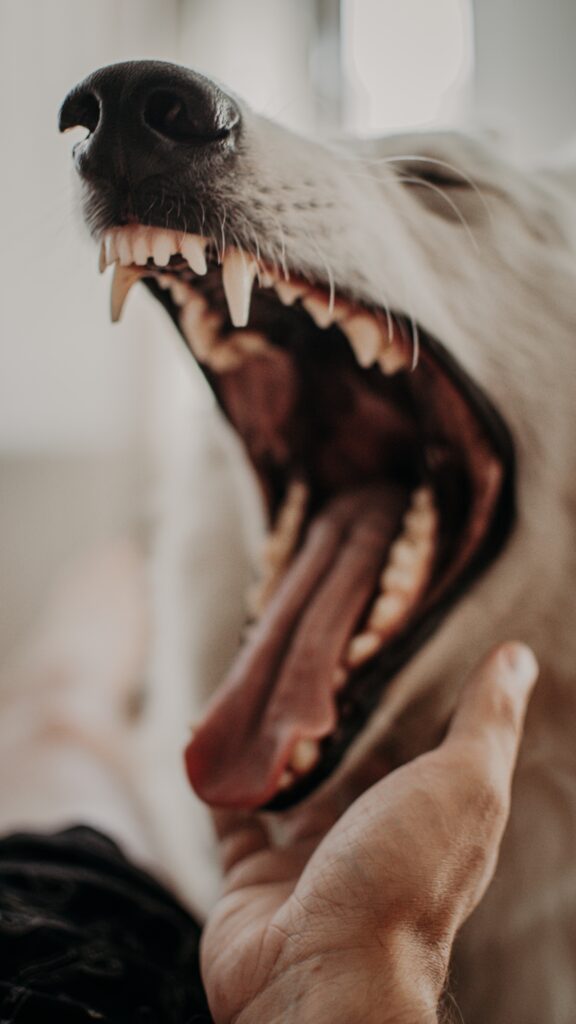
Professional dog dental care options: procedures and costs
Professional Dog Dental Cleaning: What to Expect
If you’re considering taking your dog for professional dental cleaning, there are several things you should know. Below are some details to keep in mind.
- Dental cleaning usually involves the use of anesthesia, which is important for the safety and comfort of your dog.
- A thorough dental cleaning will typically involve several steps, including an oral exam, cleaning, scaling, and polishing of the teeth, and potentially the extraction of any damaged or infected teeth.
- It’s important to follow your vet’s instructions for preparing your dog for the procedure and caring for them afterward to ensure a successful and safe recovery.
If you’re still unsure whether professional dental cleaning is right for your dog, don’t hesitate to talk to your vet to get more information.
Common Anesthesia Risks in Dog Dental Procedures
While anesthesia is a necessary part of many dental procedures for dogs, it does come with some risks. Here are some of the most common:
- Respiratory depression, which can cause difficulty breathing or even respiratory arrest
- Cardiac arrest or other cardiovascular complications
- Hypotension or low blood pressure, which can lead to organ damage or failure
- Allergic reactions to the anesthesia or other medications used during the procedure
To minimize these risks, it’s important to choose a reputable vet with experience performing dental procedures and to follow all pre- and post-operative instructions carefully.
How Often Should You Schedule Professional Dog Dental Cleanings?
The frequency of professional dental cleanings for dogs will depend on several factors, including their age, breed, and overall dental health. Here are some general guidelines to keep in mind:
- Puppies may need their first dental cleaning as early as 6 months of age, while adult dogs may need cleanings as frequently as every 6-12 months.
- Dogs with existing dental problems, such as periodontal disease or broken teeth, may need more frequent cleanings.
- Your vet can recommend a schedule for your dog based on their individual needs and risk factors.
Regular dental cleanings can help prevent serious dental problems and keep your dog healthy and comfortable. Talk to your vet to determine the best schedule for your dog’s dental care.
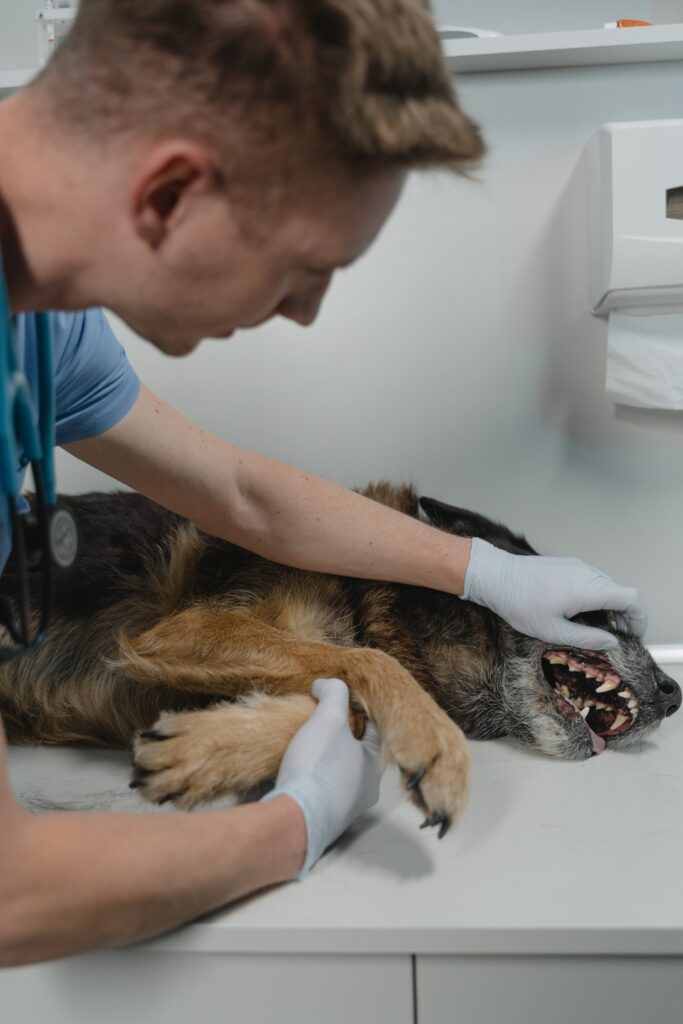
The Cost of Professional Dog Dental Care: What to Expect
Regular dog dental care is essential for your dog’s overall health and well-being, but many pet owners are hesitant to take their dog for professional dental cleanings due to concerns about cost. Here are some important things to know about the cost of professional dog dental care:
- The cost of professional dog dental care can vary widely depending on a number of factors, including where you live, the specific services required, and the severity of your dog’s dental issues.
- In general, professional dental cleanings for dogs can cost anywhere from $300 to $800 or more, depending on the above factors.
- While the cost of professional dental care for your dog may seem steep, it’s important to remember that investing in your dog’s dental health now can help prevent more serious and costly health problems down the road.
In conclusion, while the cost of professional dog dental care can be a concern for pet owners, it’s important to prioritize your dog’s health and well-being by seeking regular dental care as recommended by your veterinarian.
Alternative Sedation Methods for Dog Dental Procedures
Many pet owners are understandably concerned about the risks associated with traditional anesthesia during dental procedures for their dogs. Fortunately, there are alternative sedation methods available that can be both safer and more effective for your dog. Here are some of the most common alternative sedation methods used in dog dental procedures:
- Sedation through inhalation: This method involves administering sedation gases to your dog through a mask or tube, which is safer than traditional anesthesia because it allows for more precise control over the level of sedation.
- Oral sedation: Oral sedatives can be administered to your dog in the form of pills or liquids, and can be used alone or in conjunction with other sedation methods.
- Local anesthesia: Local anesthesia can be used to numb specific areas of your dog’s mouth during dental procedures, reducing the need for general anesthesia and minimizing the risks associated with traditional anesthesia.
In conclusion, if you’re concerned about the risks associated with traditional anesthesia during your dog’s dental procedures, it’s important to speak with your veterinarian about alternative sedation methods that may be safer and more effective for your pet.
The Role of X-Rays in Professional Dog Dental Care
X-rays are an important part of professional dog dental care, as they allow veterinarians to identify and treat dental issues that may not be visible to the naked eye. Here are some of the most important roles that x-rays play in professional dog dental care:
- Detecting tooth decay: X-rays can be used to detect tooth decay that may not be visible to the naked eye, allowing veterinarians to address the issue before it becomes more serious.
- Identifying broken teeth: X-rays can help identify broken teeth that may be hidden beneath the gum line, allowing veterinarians to address the issue before it leads to infection or other dental problems.
- Diagnosing oral tumors: X-rays can be used to diagnose oral tumors in dogs, allowing veterinarians to develop a treatment plan that is tailored to your pet’s specific needs.
In conclusion, x-rays are a critical part of professional dog dental care, allowing veterinarians to identify and treat dental issues that may not be visible to the naked eye. If your veterinarian recommends x-rays as part of your dog’s dental care plan, it’s important to trust their expertise and follow their recommendations.
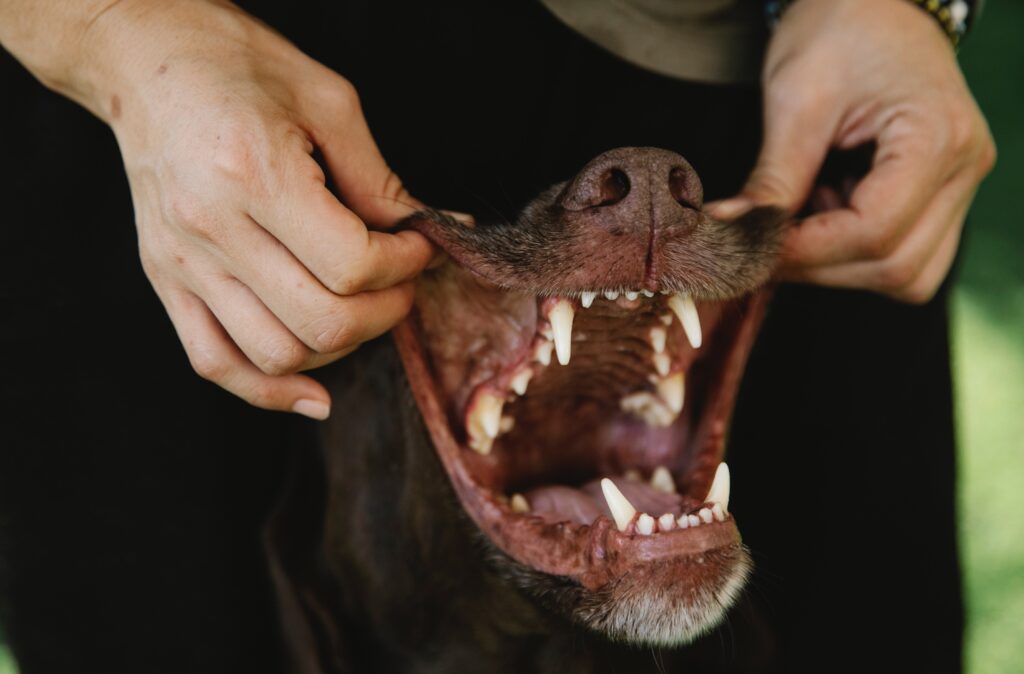
Natural remedies: do they work?
Natural Remedies for Bad Breath in Dogs
Bad breath in dogs can be a sign of dental problems, so it’s important to address it promptly. Here are some natural remedies for dog bad breath:
- Incorporate parsley or mint into your dog’s diet to freshen breath naturally
- Use a mixture of water and apple cider vinegar as a mouthwash to reduce odor-causing bacteria
- Give your dog bones to chew on to help remove plaque and freshen breath
If your dog’s bad breath persists, it’s important to schedule a dental exam with your veterinarian to address any underlying dental issues.
Using Herbs and Spices for Natural Dog Dental Care
Herbs and spices have been used for centuries for their natural healing properties, including for dental care. Here are some herbs and spices that can be used for natural dog dental care:
- Turmeric is an anti-inflammatory that can help reduce gum inflammation and promote healthy teeth
- Sage has natural antiseptic properties that can help reduce bacteria in the mouth
- Cloves contain eugenol, which can help soothe toothaches and reduce inflammation
When using herbs and spices for your dog’s dental care, it’s important to do so in moderation and under the guidance of a veterinarian.
The Role of Coconut Oil in Dog Dental Health
Coconut oil has become increasingly popular for its various health benefits, including for dental health. Here’s how coconut oil can benefit your dog’s dental health:
- It can help reduce inflammation in the gums and promote healthy teeth
- Coconut oil has antibacterial properties that can help reduce the buildup of harmful bacteria in the mouth
- It can help freshen breath naturally
To use coconut oil for your dog’s dental health, simply apply a small amount to their teeth and gums or mix it into their food.

The Benefits of Raw Bones for Dog Dental Health
Maintaining your dog’s dental health is important for their overall well-being. Here are some reasons why raw bones can be beneficial for your dog’s dental care:
- Raw bones provide a natural way to scrape plaque and tartar off your dog’s teeth, promoting good oral hygiene.
- Chewing on raw bones can exercise your dog’s jaw muscles, improving their dental strength and reducing the risk of tooth decay and gum disease.
- Raw bones also serve as a healthy treat that is both enjoyable and nutritious for your dog, providing essential minerals and nutrients.
Incorporating raw bones into your dog’s dental care routine can be a great way to support their dental health in a natural and enjoyable way.
Natural Dental Care Products: Do They Work?
While there are many natural dental care products available for dogs, it can be difficult to determine which ones are effective. Here are some things to consider when choosing natural dental care products:
- Look for products that have been certified by the Veterinary Oral Health Council (VOHC), which indicates that they have been proven to effectively reduce plaque and tartar.
- Check the ingredients list and make sure that the product contains natural, safe, and non-toxic ingredients that are beneficial for your dog’s oral health.
- Consider the form of the product, such as chews, sprays, or gels, and choose one that your dog is comfortable with.
While natural dental care products can be effective, they should be used in combination with regular brushing and professional dental cleanings for optimal results.
The Importance of a Balanced Diet for Natural Dog Dental Care
Your dog’s diet plays a crucial role in their overall health, including their dental health. Here are some ways that a balanced diet can support your dog’s dental care:
- Providing your dog with a balanced and nutritious diet can help to reduce the risk of dental problems such as plaque buildup and gum disease.
- Choosing foods that are high in fiber can help to clean your dog’s teeth naturally by promoting saliva production and scrubbing the teeth as they chew.
- Avoiding sugary and starchy foods can help to prevent the growth of harmful bacteria in your dog’s mouth, reducing the risk of dental decay.
Incorporating a balanced and nutritious diet into your dog’s dental care routine can be a simple yet effective way to promote good oral health.
Conclusion
We hope that by now, you have a better understanding of the importance of dog dental care. From preventing common dental problems to using natural remedies and professional care, there are many ways to maintain your dog’s dental health. So, whether you choose to use dental products or opt for natural remedies, remember that a little effort can go a long way in keeping your dog healthy and happy. After all, a happy dog means a happy life for both you and your furry friend. So, let’s get started on that doggy dental routine and make those tails wag with joy!